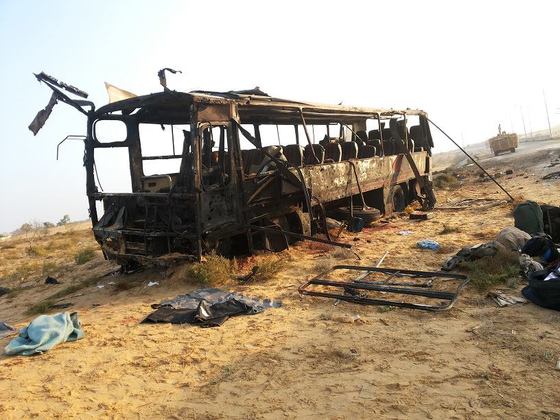 A car bomb attack this morning in North Sinai killed at least 11 Egyptian security personnel and wounded more than 35. The attack, one of the bloodiest since the overthrow of the Morsi regime in early July, targeted a convoy of buses transporting security personnel from Rafah to Cairo.
A car bomb attack this morning in North Sinai killed at least 11 Egyptian security personnel and wounded more than 35. The attack, one of the bloodiest since the overthrow of the Morsi regime in early July, targeted a convoy of buses transporting security personnel from Rafah to Cairo.
In response to the attack, army spokesman Ahmed Ali said on his Facebook page that “[t]he precious blood of our sons strengthens our resolve to cleanse Egypt and shield its sons from violence and treacherous terrorism.” According to Al Ahram, “[t]roops and Apache helicopters have been combing the area for the perpetrators.”
Separately, in Cairo, four security personnel were wounded today when an explosive device was thrown toward a checkpoint in the Egyptian capital, AFP reported.
Today’s attacks come a day after Ansar Jerusalem (Ansar Bayt al Maqdis) claimed responsibility for the Nov. 17 shooting attack on Lieutenant Colonel Mohammed Mabrouk, a senior national security officer, in Cairo. Yesterday, Ansar Jerusalem also released a video detailing its Oct. 7 suicide bombing attack on the South Sinai Security Directorate.
Since the ouster of Mohammed Morsi on July 3, there have been at least 251 reported attacks in the Sinai Peninsula, most of which were against Egyptian security forces and assets, according to data maintained by The Long War Journal. Since July, the number of attacks has declined each month. November, which has already seen 27 attacks, is currently on pace to surpass October’s total, however.
Ansar Jerusalem has also conducted a few attacks outside of its normal base of operations in North Sinai in recent months. On Sept. 5, the jihadist group carried out an assassination attempt in Nasr City on Egypt’s interior minister, Mohammed Ibrahim. A month later, an Ansar Jerusalem suicide bomber unleashed a blast at the South Sinai Security Directorate in el Tor, which killed three security personnel and injured more than 45. And on Oct. 19, the Sinai-based jihadist group targeted a military intelligence building in the city of Ismailia.
In the face of continued Egyptian military operations in the Sinai, Ansar Jerusalem has shown that it is adapting rather than folding.
Are you a dedicated reader of FDD's Long War Journal? Has our research benefitted you or your team over the years? Support our independent reporting and analysis today by considering a one-time or monthly donation. Thanks for reading! You can make a tax-deductible donation here.







